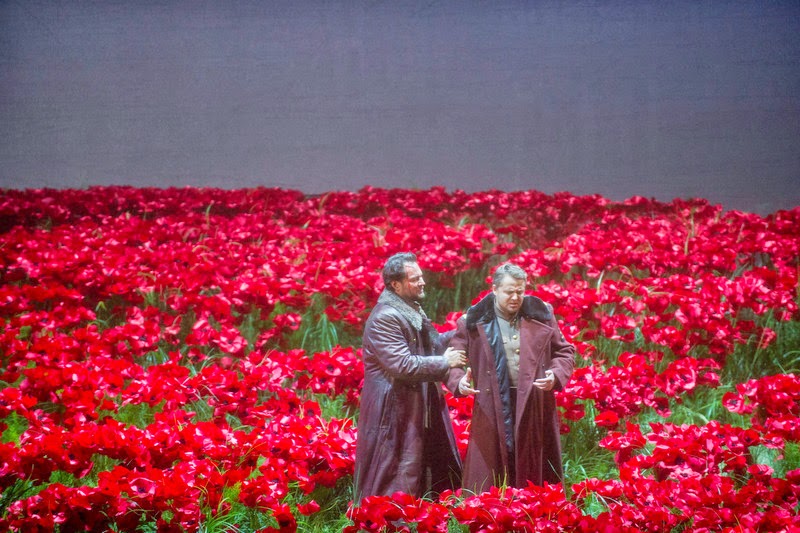Ildar Abdrazakov as Prince Igor and Sergey Semishkur as Vladimir Igorevich in Borodin's "Prince Igor."
Photo: Jonathan Tichler/Metropolitan Opera
Reviewed by James
Karas
The mess of an opera that Alexander Borodin left after eighteen years of
intermittent work on Prince Igor is legendary. His
friends Rimsky-Korsakov and Glazunov finished it but it has never really worked
satisfactorily. The Metropolitan Opera has not touched it for almost a hundred
years and that is a decent gauge of the popularity of the work.
The current production by Dmitri Tcherniakov at the Met that was
broadcast world-wide in cinemas may not put Prince
Igor neck-in-neck with La Boheme but it does provide an
unforgettable night at the opera.
Most of the credit goes to Tcherniakov. He has re-imagined and recreated
the opera into an almost new work, a work that has a unity and integrity that
is simply astounding. He uses basically two sets. The set for the Prologue is a
Spartan, two-story room that struck me as an army barracks. In the first act
the set consists of a field of poppies in the midst of which all the action
takes place including the famous Polovtsian Dance.
The barracks serve, with some modifications, as a town square in the
Prologue, a room in a palace, a prince’s court and the destroyed city of the of
Putivl. The final scene of the razed city is quite dramatic but nothing is as
memorable as the expanse of poppies.
Prince Igor is an epic opera and deals with heroism,
patriotism, defeat, treachery and rebirth. There is a love interest or two but
they are almost sidelines to the story. Tcherniakov molds those characteristics
in a marvelous fashion to humanize Igor and to make the entire opera more
humane and much less heroic and bombastic. We see the defeated, wounded and
captured Igor in a huge field of poppies. We are not sure if he is dreaming,
hallucinating or is in fact in this landscape. His enemy offers him his freedom
for a price and he is entertained with dances of magical and surpassing beauty.
The dance is among the poppies and kudos go to Itzik Galili for his
brilliant choreography.
Igor escapes from his captors and returns to his destroyed homeland
wracked with guilt for not fighting to the death.
A scene from the Prologue of Borodin's "Prince Igor" with Ildar Abdrazakov as Prince Igor Svyatoslavich.
Photo: Cory Weaver/Metropolitan Opera
Tcherniakov uses video projections to illustrate the horrors and butchery
of war. The opening scene is full of patriotic bluster about fighting the enemy
for God and country and in the end we see the waste and evils of war. In short,
he has taken Borodin’s messy original and created a great opera production.
He had a great deal of help. Bass-baritone Ildar Abdrazakov makes a
superb Igor. He has a powerful and impressive voice with a commanding physical
presence that spelled every inch a warrior prince. Tcherniakov humanizes him in
later scenes until his final appearance where he seems almost beside himself
with guilt. He is capable of tenderness
towards his wife Yaroslavna and gives an overall outstanding performance.
Soprano Oksana Dyka is the perfect counterpart to Igor as Yaroslavna.
She is a woman in a man’s world and needs epic qualities to survive even if her
main opponent is her brother Prince Galitsky (Mikhail Petrenko). Dyka delivers
vocal and dramatic power in her confrontations and tenderness in her love scene
with Igor. The vocal line requires relatively little colouration but the role
demands lungs and a personality of steel.
There is a parallel love story between Igor’s son Vladimir (tenor Sergey
Semishkur) and Konchakovna (mezzo Anita Rachvelishvili) which is notable for
the latter’s forceful character and vigorous singing.
Petrenko sings the evil would-be usurper of the throne and his
performance is notable for his well-done swaggering and devil-may-care
villainy.
The costumes of the soldiers by Elena Zaitseva showed Red Army influence
and the civilian boyars looked like apparatchiks.
Prince Igor is notable for its choral pieces and here the
one-hundred-plus Metropolitan Opera Chorus was simply superb. Unalloyed kudos
go The Metropolitan Opera Orchestra under Gianandrea Noseda which performed
brilliantly.
With any luck, the production will be revived many times with different
casts. There are other singers who can do as well and perhaps even better in
some of the roles. As usual, Gary Halvorson, the Director for Cinema, did his
best to ruin what we saw in the movie theatre with his excessive clicking and
frequently idiotic camera shots but that is a cross that we must needs bear.
Despite that, what will remain is the quality of Tcherniakov’s vision
and interpretation. He brought coherence, humanity, originality and a personal
vision to an incomplete opera and made it work brilliantly.
_____
Prince Igor by Alexander
Borodin was transmitted Live in HD on April 14, 2014 at
the Scotiabank Theatre, 259 Richmond St. West, Toronto, Ontario. For more information: www.cineplex.com/events or www.metopera.org


No comments:
Post a Comment